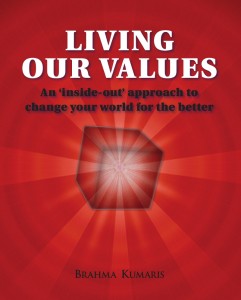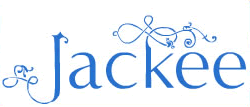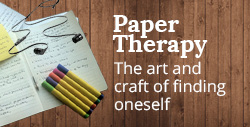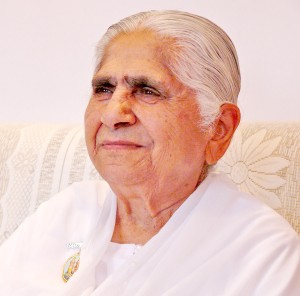Living Our Values
Last week I was a panel member at the launch of a very important book Living Our Values: An ‘inside-out’ approach to change your world for the better, published by the Brahma Kumaris in the presence of Dadi Janki the 97 year old Spiritual head of the Brahma Kumaris.
I’ve been working with the Brahma Kumaris for the last five years and have loved every moment of presenting and contributing to a few of the many projects facilitated by the Brahma Kumaris including, The Spirit of Coaching and Living With Cancer, workshops, retreats and seminars.
My time working with the BK’s is voluntary but I feel that I am very well paid as I always leave with such wisdom and internal guidance for my own spiritual and emotional development.
There’s so much about what the BK teaches that overlaps with the work of coaches and today I want to highlight the common area that both approaches share which is that of Values.
So often it can be easy to forget about asking our clients about their values, which are often the root of who they are and how they show up more exquisitely in their role as leaders and human beings. The chapter on Respect in Living Our Values open’s with this powerful quote,
“When you are content to simply be yourself and do not compare and compete, everybody will respect you.” – Lao Tzu
When I read this opening quote it really caused me to pause and reflect in a meaningful way, revealing an Inquiry question, the type of question that Coach Patrick Williams in his book, How To Become A Professional Life Coach, suggests we offer our clients as a way of deeper inquiry. I immediately connected with how spending time exploring our values allows us to show up and to express more of our authentic selves.
When we make those connections to our values we are more able to communicate and connect with others particularly in times of conflict and difficulties.
For example one of my core values is respect. So when I am able to be consciously aware of this value as I go about my day-to-day business it means I am consciously choosing and responding to others from this base line of respect and value.
When I am not connected to this value my communication and responses may be snappy and harsh, not thought through or defensive. Values and our conscious connection to our values in the present moment changes how we express ourselves and who we are in any given moment.
Take any value and you will find that once consciously embodied, expressed or even acknowledged you will experience more of the person, you will feel them and sense them.
On the panel at the launch of Living Our Values we were asked three questions:
- How important are values?
- What is your most important value?
- What value do you believe the world needs most at this time?
These are questions that can be included on a Coaching Joining form sent to your new clients before your ever first coaching session. How wonderful to dive into the beautiful deep ocean of the expansive possibility of who people really are and find out what really feeds their core through engaging in a dialogue about personal values.
Even more importantly as coaches we can and must answer these questions about values for ourselves. We cannot expect these questions to be answered until we are brave enough to dive in and answer them for ourselves.
On the panel I used the metaphor of the tree’s root as a reflection of how our core values feed our behaviours, our thoughts, our action, or well-being or un-well being.
Too often we dive into our work superficially without wanting to unravel these deeper driving forces. By bringing values into the forefront and exploring how we are expressing these core values in our work, in our relationships in our meetings and encounters with the public and with strangers many issues and problems will be gracefully dissolved.
Reflecting on what value was and is most important to me right now in my life I realise that it is the value of respect. I experience this value being sadly neglected in so many ways in organizations. Change brings with it a season of emotionality and we as individuals and a collective are notoriously poor at increasing the quantities of respect we heap onto others as they go through turbulent and difficult times.
It seems easier to go against our values and walk someone through the life changing experience of redundancies than to express the values that we hold dear somewhere deep inside but we find hard to express. It is easier to be distant, even aloof than to find the many way we can express our respect and still maintain boundaries and professionalism.
A good way of addressing this is to work through the practical exercises outlined in Living Our Values. Taking a notebook and setting aside 30 minutes will give even the faint hearted an opportunity to begin to stoke the fire around what values mean to them and to recommit to ways in which their values can be shared more explicitly in all that they do.
Here’s one of the practical exercise you will find in the points for reflection at the end of the chapter on Respect.
1. What does respect mean for you?
2. Think of someone who is an inspiring example of respect. What makes them so special? What are the secrets of their success?
3. In what ways do you demonstrate respect for yourself, for others and for nature?
4. Are there any areas in your life where you would like to be more respectful? What discourages you or prevents you from doing this?
5. How could you develop the value of respect in your life?
Living Our Values: An “inside-out approach to change your world for the better is published by the Brahma Kumaris www.bkpublications.com 
Categories Coaching | Tags:







Leave a Reply
By submitting a comment here you grant Jackee Holder a perpetual license to reproduce your words and name/web site in attribution. Inappropriate or irrelevant comments will be removed at an admin's discretion.